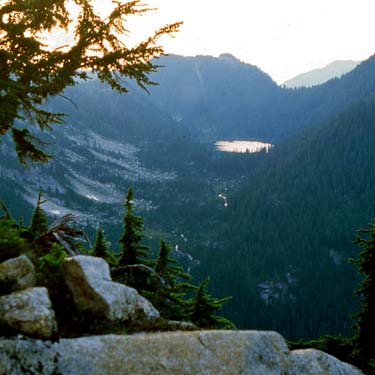

Company asking to run transmission line through Pinecone Burke Provincial Park
COMMENT: As we've argued before, a park is not merely land that has been "parked", waiting for some more "profitable" opportunity to arise for it. BC's energy policy must not be allowed to put parks in second place. The government set up this situation, by issuing water licences to Run Of River Power, and the government should rectify the problem, by cancelling those licences promptly. If a legal decision determines that a settlement is warranted, then so be it.
See also:
Hydro project sought for Pitt
NO to transmission lines in BC's parks
Larry Pynn
Vancouver Sun
Thursday, January 03, 2008
VANCOUVER - A private company is asking the Ministry of Environment to remove part of Pinecone Burke Provincial Park to allow a transmission line to connect with its proposed run-of-the-river power project in the upper Pitt River Valley.
Run of River Power Inc. says its subsidiary, Northwest Cascade Power Ltd., has submitted a park boundary adjustment proposal to allow for a 230-kilovolt transmission line measuring 4.6 km long by 30 metres wide through the 38,000-hectare wilderness park.
Run of River Power president Jako Krushnisky asserted in an interview Thursday that the project won't be feasible without going through the park, and believes the impact of the transmission line to be minimal - a statement immediately refuted by conservation groups.

The Boise Creek headwaters in Pinecone Burke Provincial Park. A private company is
seeking the Ministry of Environment's precedent-setting approval to alter the boundaries
of Pinecone Burke Provincial Park in the Lower Mainland to allow for a transmission
line that would connect with its proposed run-of-the-river power project in the upper
Pitt River Valley.
Handout/Western Canada Wilderness Committee
"This is in the best interests of developers, not the park," responded Gwen Barlee, policy director with the Western Canada Wilderness Committee.
"The reason the transmission line is (proposed to be) going through the park is because it's convenient for the developer and it's cheap."
Krushnisky said the company has identified 473 hectares of Crown land suitable as grizzly bear and mountain goat habitat in the upper Pitt River that could be added to the park to make up for the transmission line.
The company says a total of 42 km of transmission line is needed to connect its proposed upper Pitt power project, currently under environmental review, with BC Hydro's Cheekye substation near Squamish.
The Liberal government approved the Provincial Park Boundary Adjustment Policy, Process and Guidelines in July 2004, which allowed for amendments "on a case by case basis where there are compelling provincial economic, environmental and societal benefits that exceed preserving the integrity of the existing park boundary and values."
If the Pinecone Burke proposal is allowed, it would represent two firsts under the 2004 policy: the first transmission line okayed in a park in B.C. and the first park allowance for industry in the Lower Mainland. Earlier this year, B.C. allowed the deletion of 478 hectares for pipeline expansion through Mount Robson provincial park.
"What does this signal for the integrity of our park system for the future?" Barlee said.
"It doesn't look very good. This is a government that has turned its back on provincial parks."
The B.C. government also passed Bill 30 in 2006 making it impossible for local governments to block run-of-the-river power projects, but that hasn't stopped them from taking a position. Coquitlam council has voiced "strong opposition" to the power proposal, Maple Ridge has "serious reservations," and Pitt Meadows's support is "subject to the mitigation of any negative environmental impacts."
The BC Parks website describes the Pinecone Burke as a "wilderness area protecting old-growth forests, numerous alpine lakes, rugged terrain, and remnant icefields."
Among the long list of conservationists lined up against the project is Order of Canada recipient Mark Angelo, rivers chair of the Outdoor Recreation Council of B.C. and head of BCIT's fish and wildlife program.
He said he is "very much concerned" about the project given the great ecological values of the upper Pitt, an area "that deserves to be protected in its natural state."
The company's project would divert waters from eight streams - Bucklin, Steve, Pinecone, Homer, Boise, Shale, Corbold, and East Corbold - in the remote upper Pitt River Valley north of Pitt Meadows.
"One of the reasons I'm involved in this business is because I am concerned about the environment," Krushnisky said. "I am a green guy."
Dan Gerak, owner of Pitt River Lodge fly-fishing resort, is adamantly opposed to the project.
"So, really what they are proposing is to ruin our parks so that they can save money. Why are we even creating these parks when years down the road industry can apply to change the boundaries and land can be removed?"
Environment Minister Barry Penner is on holidays and unavailable to comment.
Dolly Varden, bull trout, cutthroat trout, rainbow trout, steelhead, and five species of salmon live in the upper Pitt River, along with species at risk such as marble murrelet, peregrine falcon, northern goshawk, and northern spotted owl.
Posted by Arthur Caldicott on 05 Jan 2008